
Publication Information
Published by: Admin
Published: 1 year ago
View: 276
Pages: 30
ISBN:
Abstract
In this study, nexuses between governance and natural resource rents are assessed in 44 sub-Saharan African countries using data for the period 1996-2016. The empirical evidence is based on Tobit regressions. The findings show that political governance (entailing “voice & accountability” and political stability) and institutional governance (consisting of the rule of law and corruption control) have a negative effect on resource rents. However, if the conception and definition of attendant governance variables are understood within the framework that such variables are negatively skewed, it becomes apparent that bad governance reduces resource rents. This conclusion clarifies the paradox because negatively skewed governance variables are understood to be representing poor governance. By extension, the negative effect of the rule of law or corruption control on natural resource rents should be the negative effect of the absence of the rule of law or lack of corruption control on natural resource rents. The paradox is further clarified in the light of specific components of the governance dynamics. While the clarification of the paradox is relative, especially if the sample is compared with countries for which governance indicators are largely skewed in the positive direction, from an absolute perspective (i.e. exclusively from the sampled countries), the indicators of the World Bank are standardized such that negative skewness does not affect the estimated results. Another worthwhile argument with which to explain the paradox is that governance has more impact on the non resource component of GDP.
Nicholas M. Odhiambo Mr
Simplice A. Asongu Prof
Related Publications

VOLUME 6 ISSUE 3 2023
The role of mobile money innovations in transforming unemployed women to self-employed women in sub-Saharan Africa

VOLUME 6 ISSUE 3 2023
The Impact of National Home Grown School Feeding Programme (NHGSFP) on Rural Communities in Nigeria

VOLUME 6 ISSUE 3 2023
Microfinance institutions and female entrepreneurship in Sub-Saharan Africa: avoidable female unemployment thresholds
